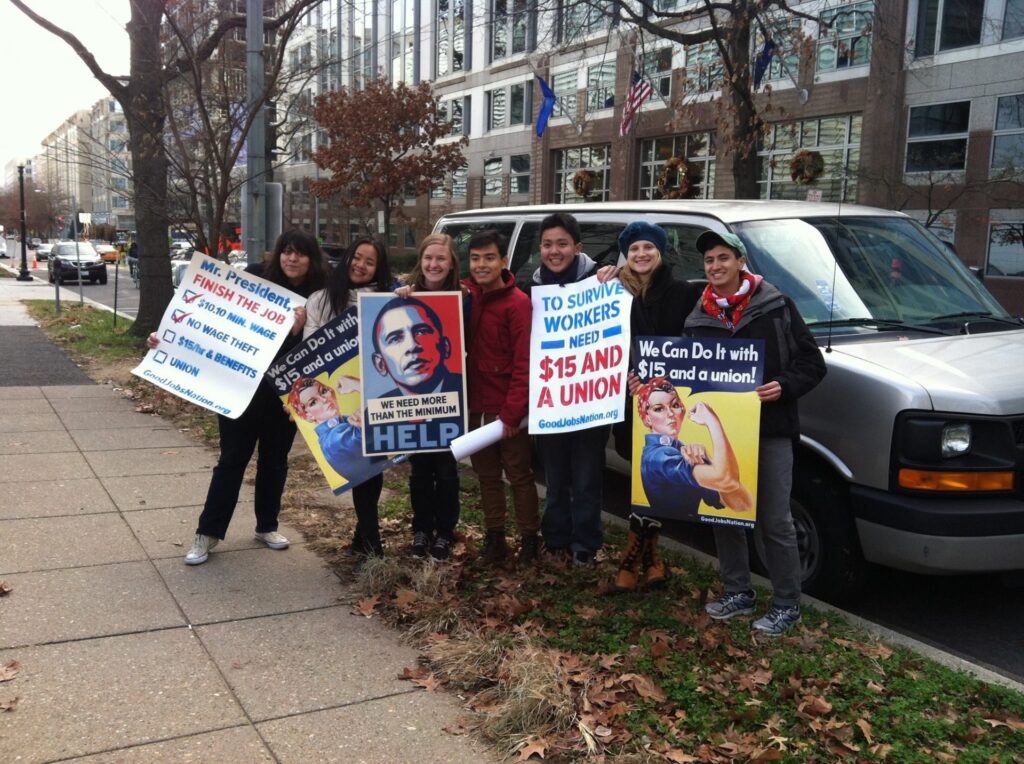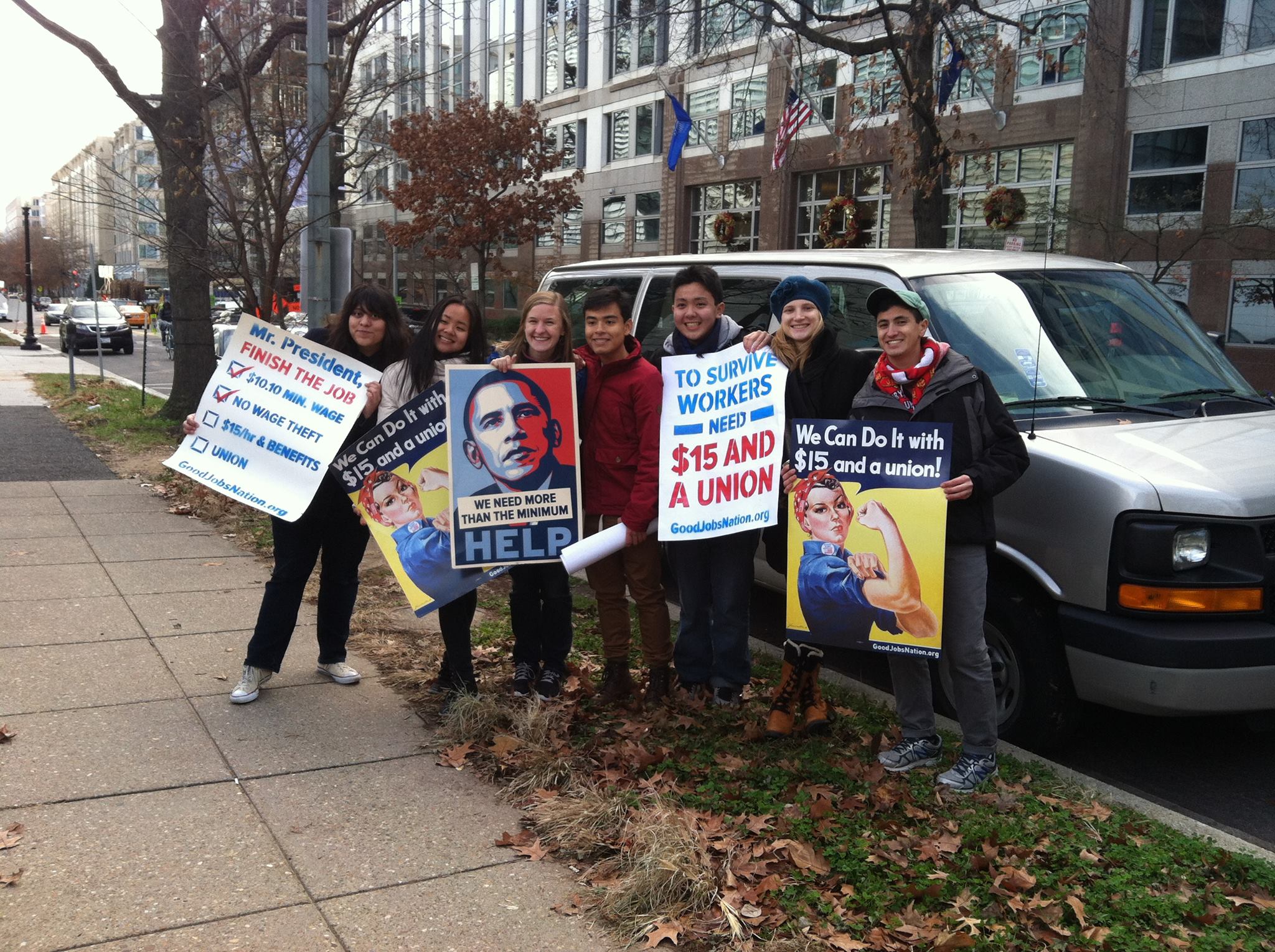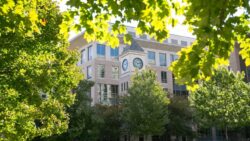
Photo: Kalmanovitz Initiative for Labor and the Working Poor
This semester, the Kalmanovitz Initiative for Labor and the Working Poor (KI), which develops strategies and public policy to improve workers’ lives and advance justice, launched a new Immigration and Labor Project (ILP), replacing the Day Laborer Exchange Program (DLE). Participants in the new project are to engage more deeply with community partners, namely Georgetown’s Center for Social Justice (CSJ) and the D.C. Employment Justice Center (EJC), to support grassroots projects working to address issues of immigration and labor in D.C.
DLE began in 2012 as a way to foster relationships between students at Georgetown and D.C.’s day laborer community. According to Ashley Valenzuela (COL ‘18), a coordinator for the ILP, the group usually worked with between 30 and 40 of these workers, who are hired on a day to day basis by external employers without any promises of future work.
DLE had partnered with Trabajadores Unidos or Workers United, a group of day laborers, according to Nick Wertsch, Program Coordinator at the KI. Students met with these workers on Tuesday, Wednesday, and Thursday mornings at the Brentwood Home Depot in northeast D.C. to educate them about their rights and help them practice their English.
“We would go out in the mornings from 8:00 a.m. to 10:00 a.m. and talk to day laborers about what was going on and really try to establish relationships with them,” Valenzuela said. She then explained that establishing relationships was crucial in order to garner support for a worker’s center for the day laborers through petitioning and canvassing.
Wertsch explained that the creation of a worker’s center run by Trabajadores Unidos would help day laborers better advocate for their rights and regularize the way that they get hired. “Over the last few years, [our focus] gradually shifted to helping support their efforts in the creation of a worker center,” he said.
After working toward this goal for the past few years, however, Wertsch and some of the other coordinators decided that what students could provide as part-time volunteers was no longer in line with what the workers needed. “The current phase of the [project of erecting a worker center] would require us to maintain a more consistent on-the-ground presence at the organizing site and in the community, a commitment that we are unable to fulfill on both organizational and individual levels as full-time students,” Chris Wager (SFS ‘17), a student coordinator for the ILP, wrote in an email to the Voice.
As a result, a small group of committed students decided to meet over the summer and redefine the organization’s mission, name, and structure. Valenzuela explained that the focus of the organization is broadening to work not only with day laborers, but also with the immigrant community at large.
The new ILP has hired five paid coordinators, selected Sept. 10, and has accepted a few volunteers already, but is still looking for a couple more. In past years, DLE has only had two coordinators and fifteen volunteers. “I guess the idea is that the bigger the group, the less people feel accountable to come, but when it’s smaller, you can see who hasn’t shown up, especially if it’s paid,” program coordinator Aissatou Diallo (COL ‘18) said.
Over the summer, coordinators grappled with developing a comprehensive mission statement of the program’s goals and a more general vision statement to fit the program’s new direction. They concentrated on creating a mission statement that helped members understand the larger goal of the project, which will focus on the entire immigrant community, and outlines the communities the program will target. “We ended up including both working and immigrant and low-income [communities], actually. We don’t want to exclude anybody,” said Diallo.
This year, volunteers and coordinators in the ILP will work on two separate initiatives: one with the CSJ and the other with the EJC.
The CSJ project will continue the research that began this summer on D.C.’s new Limited Purpose Driver’s Licenses, which allow undocumented individuals to obtain a license from the D.C. Department of Motor Vehicles without having a social security number. According to CSJ Evaluation Specialist Dr. Diana Guelespe, who is leading the research project, her work aims to report on the challenges undocumented immigrants face as they try to obtain these licenses such as an 80 percent failure of the driver knowledge exam and a six-month wait for appointments.
Thus far the CSJ’s research has found that the licenses provide tangible benefits for undocumented immigrants and their families, and predict that the recommendations they issue will have an important impact. “We hope that this research will improve license accessibility and decrease the social polarization faced by undocumented immigrants, reduce immigrants’ fear of authorities, and strengthen community relationships,” Guelespe wrote in an email to the Voice.
Student volunteers are working with the CSJ to transcribe and conduct interviews, compile information, and analyze data, according to Wertsch. Those involved with the project also plan to partner closely with community organizations, in particular the Central American Resource Center, which provides services to low and moderate income Latinos in the D.C. area, and Trabajadores Unidos, to aid in Guelespe’s research.
[pullquote]“It represents a more deliberate, guided, yet flexible framework for engaging with the labor and migrant justice movement in the D.C. community.”[/pullquote]
The second component of the ILP will be a partnership with the EJC, an organization which advocates for workers in the D.C. area. Among the services the EJC provides is a weekly free clinic for workers with legal issues, including unjust firing or wage theft. Wertsch also noted that the EJC’s services extend beyond the scope of legal assistance. “If they can’t help someone with their legal problem or someone doesn’t want to pursue it in the courts, another way to try to get results or to change the way employers treat employees is to try to do some community organizing,” said Wertsch.
Students working with the EJC are to assist primarily with intake and paperwork and to provide support for the center’s campaigns. Diallo mentioned that one way students can directly help workers is by participating in walkbacks. “When someone is fired unjustly and they go to EJC, the EJC would bring back members to walk back with them [to their job], literally, and that usually puts a lot of pressure [on employers] to help the person get their job back,” she said.
Student coordinators say both projects are better suited to students’ capabilities and the needs of the working and immigrant communities, and they represent a crucial shift from the former DLE program’s approach.
“This is important because it represents a more deliberate, guided, yet flexible framework for engaging with the labor and migrant justice movement in the D.C. community, “ wrote Wager. “The new iteration of the program prioritizes a deep respect for the autonomy of community members in developing and realizing their own visions for change.”
This article was originally published in the Sept. 25, 2015 issue with the headline, “Reaching Out: Georgetown Students Redefine Engagement with the Immigrant Community through the Immigration and Labor Project.”





